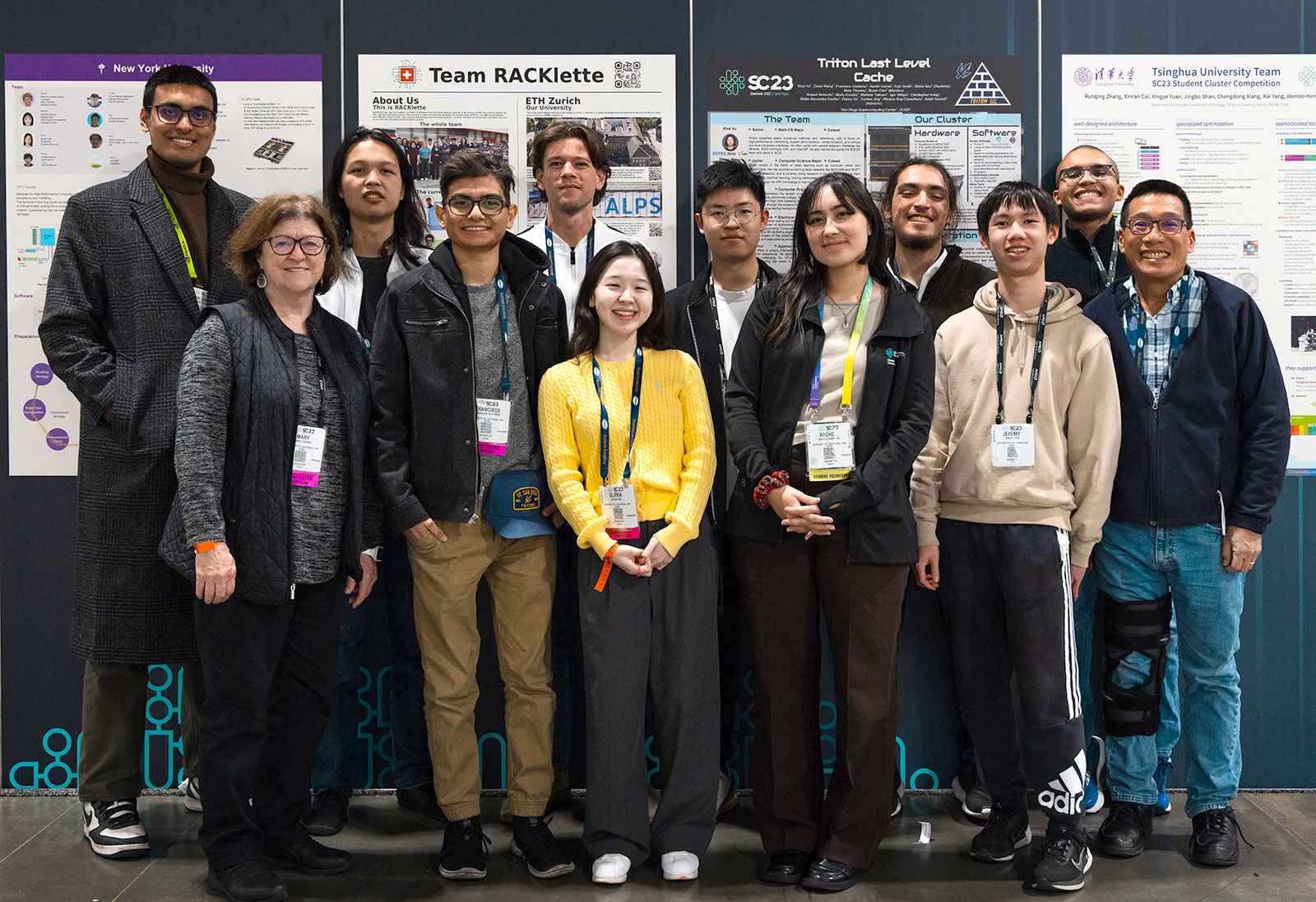

 Skip to navigation
Skip to navigation
Site Primary Navigation:
- About SDSC
- Services
- Support
- Research & Development
- Education & Training
- News & Events
Search The Site:

Published January 29, 2024

This year’s UC San Diego SCC award-winning team. Front row: Mary Thomas (mentor), Francisco (Paco) Guitierrez, Gloria Seo, Rachel Handran, Jeremy Tow, Bryan Chin. Back row: Anish Govind, Khai Vu, Kyle Smith, Zixian Wang, Austin Garcia, Triston Babers. Credit: Jeremy Tow
By Kimberly Mann Bruch, SDSC Communications
A team of UC San Diego undergraduate students won third place in the annual Student Cluster Competition (SCC), which was held at the recent 2023 Supercomputing Conference in Denver, Colorado. The students, from the San Diego Supercomputer Center (SDSC) and Jacobs School of Engineering at UC San Diego, called their team Triton LLC (Last Level Cache). They were among a total of 11 in-person teams from around the world selected to compete. This is the second year in a row the student team has garnered awards at the supercomputing competition.
Six UC San Diego undergraduate students— Austin Garcia, Francisco Gutierrez, Khai Vu, Kyle Smith, Song Hee Seo and Zixian Wang— made up the competition team. The students were mentored by Mary Thomas (SDSC) and Bryan Chin, a UC San Diego computer science lecturer–with assistance from SDSC staff members Andreas Goetz, Martin Kandes, Mahidhar Tatineni and Bob Sinkovits as well as several mentors from AMD.
The competition consisted of the team running industry benchmarks such as High Performance Linpack, High Performance Conjugate Gradients (HPCG) and MLPerf Inference Benchmark, a leading AI Inference benchmark suite that measures the speed of a trained neural network when performing inference tasks on new data. Students had to fine-tune their computer cluster to maximize performance while staying under a power limit. In addition, they were graded on their ability to run two programs simulating atmosphere and 3D magnetohydrodynamics, as well as reproducing results on a technique for Cholesky Decomposition, and were surprised with a Capture the Flag mystery application.
“The competition provides undergraduate students with the opportunity to learn about, and work with, advanced HPC hardware and software which provides them with skills and experience that they can apply in their studies, research and future careers,” said Thomas, SDSC's HPC training lead.
For the benchmarking award in MLPerf Inference Benchmark, UC San Diego shared the win with Peking University.
“It has been my most valuable experience working and learning with the whole team, spending 30+ hours every week for three months, striving for better performance on benchmarks and applications,” said Wang, a UC San Diego student majoring in computer science. “The competition result was very rewarding and I truly appreciate everyone’s effort and enjoy the time together aiming for the same goal.”
According to Thomas, the win was especially rewarding since Peking used NVIDIA software on the newest H100 accelerator hardware, while the UC San Diego team developed new software solutions to run the benchmark on AMD Instinct™ accelerators. The SCC23 team, led by Wang and Vu and advised by Miro Hodak from AMD, ported the code to the AMD Instinct GPUs and created the necessary system configurations and environment. Together, they were able to achieve some of the first results of the benchmark on the AMD hardware and to publish their results on the MLPerf website.
“AMD Instinct accelerators deliver leadership performance for the most demanding AI and HPC workloads. The AMD ROCm™ open software platform supports a wide range of AI inference and training tools making AMD the premier platform for AI development. It was the seamless support for PyTorch and ONNX runtime that enabled the team to port the code and optimize its performance,” said Hodak, senior member of technical staff for AI and ML Solutions Architecture at AMD, co-chair of MLPerf Inference working group.
In addition to the students who competed in Denver, the following students also contributed their skills to the team’s ultimate success: Triston Babers, Jeremy Tow, Anish Govind who presented a paper at the conference and student volunteer Rachel Handran. As part of the program at UC San Diego, the SCC program includes independent study course credit. To extend the impact of the SCC program and student experiences, the course also included a “home” team of students who co-trained with the competition team: Aarush Mehrotra, Akhilm Ram Shankar, Arnav Talreja, Brandon Szeto, Henry (Keng-Lien) Lin, James Choi, James Han, Pranav Prabu. Many of these students are interested in applying to be on the team next year.
To learn more about Triton LLC (Last Level Cache), their SC23 poster shares details and more information can be found on the SDSC/UCSD SCC23 team website.
The Student Cluster Competition was developed in 2007 to immerse undergraduate and high school students in HPC. SCC teams consist of worldwide participants, in a non-stop, 48-hour challenge to complete a real-world scientific workload, while keeping the cluster up and running, and demonstrating to the judges their HPC skills and knowledge. Each SCC team consists of six students who design and build a small cluster with support from mentors, as well as hardware and software industry partners. The teams learn designated scientific applications and apply optimization techniques for their chosen architectures.
To learn more about the SCC series, see the Student Cluster Competition website. To learn more about the UC San Diego/SDSC SCC teams, see the HPC Students website.
AMD, the AMD Arrow logo, AMD Instinct and combinations thereof are trademarks of Advanced Micro Devices.
Share